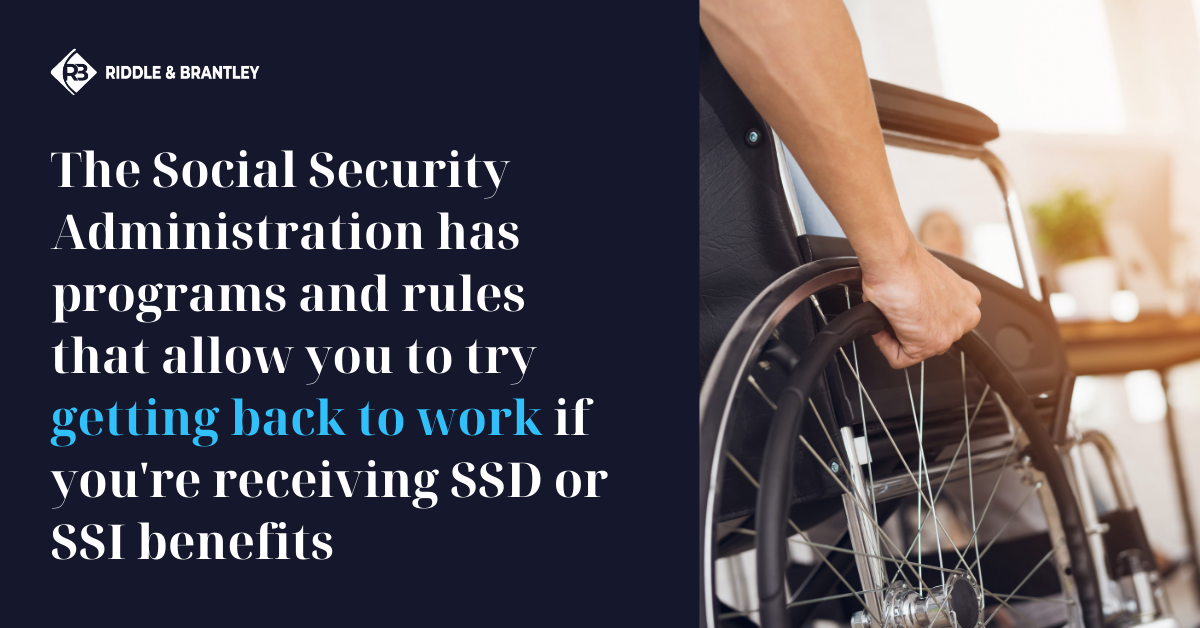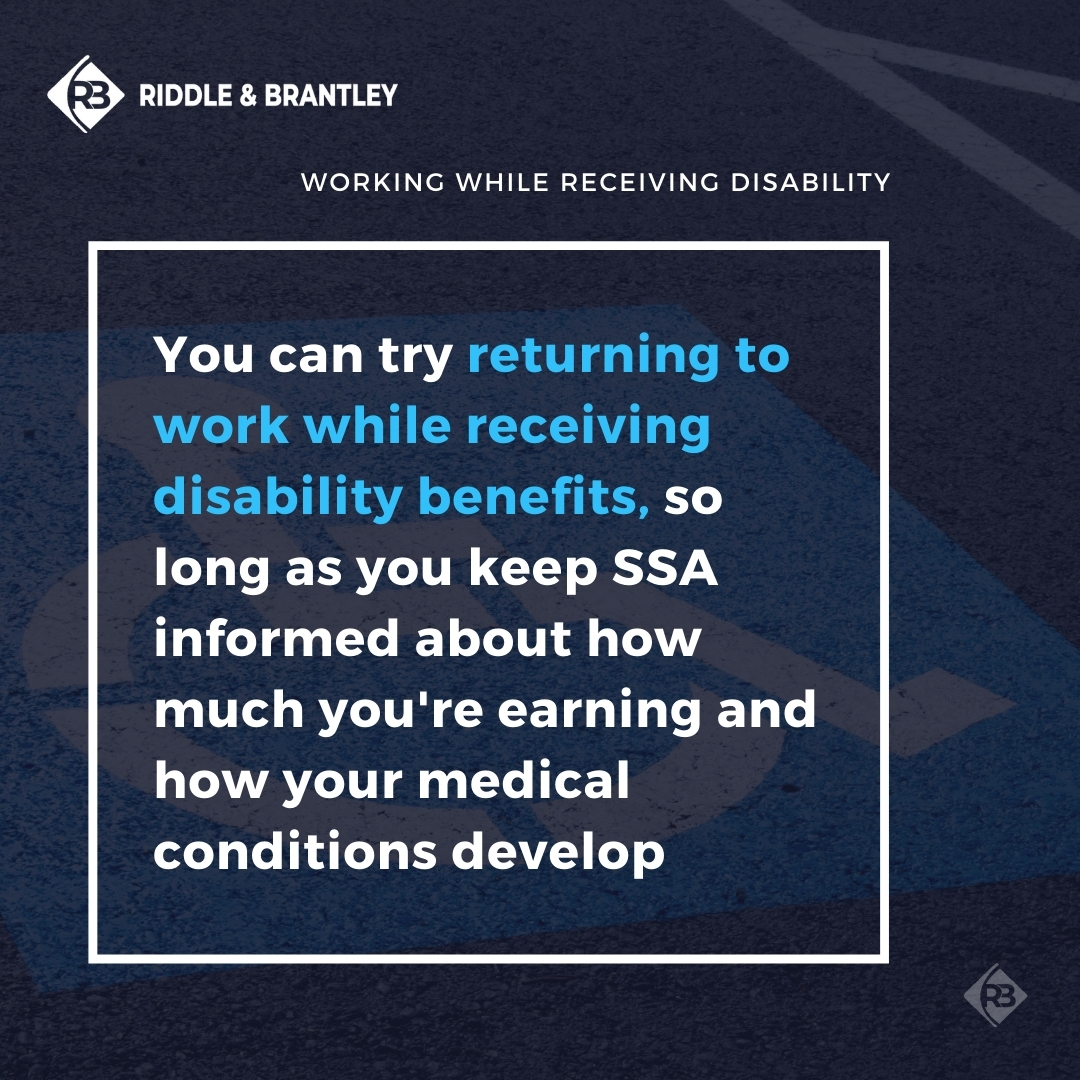“Can I Get Disability While I’m Still Working?”
“Can I get disability while I’m still working?”
It’s a question we hear fairly often from our clients.
 Some disabled persons who receive Social Security Disability (SSD) or Supplemental Security Income (SSI) benefits have the ability and the desire to work despite their impairments. For many of them, the threat of having their benefits cut off keeps them from trying to work, even part-time. Fortunately for such people, the Social Security Administration has a number of programs and rules that allow people to attempt to reenter the work force while managing their disabling medical conditions.
Some disabled persons who receive Social Security Disability (SSD) or Supplemental Security Income (SSI) benefits have the ability and the desire to work despite their impairments. For many of them, the threat of having their benefits cut off keeps them from trying to work, even part-time. Fortunately for such people, the Social Security Administration has a number of programs and rules that allow people to attempt to reenter the work force while managing their disabling medical conditions.
Different sets of rules for working while receiving benefits apply to SSD versus SSI claims.
Working While Getting Disability Benefits: Rules for SSD Recipients
If you’re receiving SSD but then you find a job you think you might be able to do despite your medical problems, you can give it a try by utilizing a rule called the “Trial Work Period.” This allows you to work at a job for as long as nine months while still receiving your full Social Security Disability benefits no matter how much you earn, PROVIDED THAT:
- You report your work and earnings; and
- Your medical conditions don’t improve
You can utilize your Trial Work Period for up to nine total work months within a 60-month (five year) period. If you lose your job at any time during that Trial Work Period, you just notify SSA and your benefits continue as long as you are still disabled.
“What happens when the Trial Work Period expires?”
Once you use up all nine months of your Trial Work Period and you find you can still do the job despite your medical problems, your disability benefits will stop. However, as long as you remain disabled, you can then take advantage of what is called the “Extended Period of Eligibility.”
Extended Period of Eligibility
For this three-year period AFTER you use up the nine months of your Trial Work Period, you can still receive your full disability payment in any month your earnings are less than $1,310 (for year 2021; this amount is adjusted annually for inflation). These payments are automatic – you don’t have to reapply – as long as, again, your medical conditions have not improved and you keep SSA informed of your earnings.
Now, let’s say your medical conditions stay stable – you’re still just as disabled – but you’ve continued to do this job you found, AND you’ve used up your Trial Work Period AND you’ve gone past your Extended Period of Eligibility so that you no longer receive any disability benefits. At any time during the following five years, if you have to stop working because of the same medical problems that put you out of work in the first place, you can apply for “Expedited Reinstatement” of your benefits. You merely notify SSA that you’ve stopped working and they review your medical records to confirm that you are still disabled, and if so, your benefit payments start up again.
Here’s another rule that can help you work while disabled and remain eligible for benefits: If you have to pay for things that a non-disabled worker would not have to buy (things like canes or prescription medications or special means of transportation), you can deduct those extra costs from your earnings when calculating whether you hit that $1,310 (in 2021) threshold for “substantial gainful activity” work.
Working While Getting Disability Benefits: Rules for SSI Recipients:
Keep in mind that, while the definition of “disabled” is the same for SSD and SSI, SSI is only available to disabled people with very little income or property. The term “very little income” is defined by state law; in North Carolina for calendar year 2021, those limits are $794/month for individuals and $1,191/month for couples.
If you continue to be disabled but you work despite your disability, you can continue to receive SSI benefits until your earnings, added with any other income, exceed the SSI income limits.
Expedited Reinstatement for SSI
The SSI program has a version of Expedited Reinstatement (see above) that is similar, but not identical, to the SSD program. If your SSI payments are stopped because you worked and earned too much, but then you stop working because of your medical problems, your SSI benefits can be restarted without having to file a new application. The key here, again, is proving that even though you went back to work, your medical problems are still just as bad as they were when you stopped working. The theory is that people should not be punished, but rather be rewarded, for trying to work even though they are disabled.
Plan to Achieve Self-Support (PASS)
There is another interesting program available to most SSI recipients called the “Plan to Achieve Self-Support” or “PASS” program. It is a way to get yourself back to work (if your medical conditions allow it) without losing your SSI benefits.
Normally a person receiving SSI is not allowed to save up any money or property, the idea being that if you receive SSI you must be so poor that you need all of your money and property just to survive. The PASS program lets you save up the money and other resources you need to get back to work. The money you save doesn’t count against you when SSA or the state figures out how your current income and resources affect your benefits.
The PASS program is fairly complicated and it requires a lot of reporting to, and approval by, the state agency that oversees it. But, if you can make it through the complexities of the program, it can offer you a way out of poverty and reliance on SSI benefits just to live.
Can You Work While Receiving Social Security Disability Benefits?
Here’s the short answer:
 The Social Security Administration and the state agencies (like Disability Determination Services) who administer the Social Security Disability program offer a number of ways for disabled persons to try working again so they can get off the disability rolls and make a lot more money than they would from SSD or SSI benefits.
The Social Security Administration and the state agencies (like Disability Determination Services) who administer the Social Security Disability program offer a number of ways for disabled persons to try working again so they can get off the disability rolls and make a lot more money than they would from SSD or SSI benefits.
The keys to taking advantage of these programs are honesty and transparency; you have to tell SSA how much you’re working and how your medical problems are developing.
Need Help with a Disability Claim or Appeal in North Carolina?
If you or a loved one are seeking disability benefits, one of our experienced North Carolina disability lawyers can help.
Our attorneys have helped hundreds of North Carolinians get the disability benefits they need and deserve, and they would love to help you if they can.
For a FREE, no-obligation consultation with an experienced North Carolina disability lawyer, please call 1-800-525-7111 or complete the convenient form below.
There is no obligation and you only pay attorney fees if we are successful and get you disability benefits.
“I would recommend Riddle & Brantley to anyone who needs help with disability.”
–B. Fields, Riddle & Brantley client
Call 1-800-525-7111 today and let’s review your claim. We can advise you on your eligibility and best legal options and if you decide to hire us, fight tirelessly for your right to benefits.
Studies show that those who hire a disability lawyer are almost twice as likely to be approved for benefits than those who represent themselves.
Don’t gamble with the benefits you deserve — please call 1-800-525-71111 today and let’s review your claim.
Justice Counts.
*** Disclaimer: The results mentioned are intended to illustrate the type of cases handled by the firm. These results do not guarantee a similar outcome, and they should not be construed to constitute a promise or guarantee of a particular result in any particular case. Every case is different, and the outcome of any case depends upon a variety of factors unique to that case.